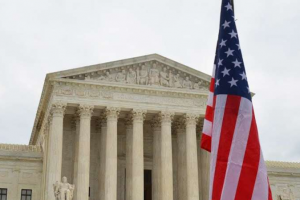A June 6, 2022 ruling of the Supreme Court of the United States (SCOTUS) strikes down Congress’ decision to increase bankruptcy fees in most states while leaving a different system in place in two states. SCOTUS unanimously holds that the two different fee systems violates the Constitution’s requirement of “uniform” bankruptcy laws.
According to Courthouse News Service, Justice Sonia Sotomayor wrote for the unanimous high court that the requirement for bankruptcy law uniformity isn’t a straitjacket but it also isn’t toothless.
The Supreme Court on Monday struck down a bankruptcy law that significantly increased quarterly bankruptcy fees in all but two states.
Justice Sonia Sotomayor concludes in the unanimous opinion that Congress violated the Constitution’s Conformity Clause when it increased bankruptcy fees in some states in not others.
“The question in this case is whether Congress’ enactment of a significant fee increase that exempted debtors in two States violated the uniformity requirement,” the Obama appointee wrote. “Here, it did.”
Congress was working to offload work from bankruptcy judges when it created a program that would allow trustees from the Department of Justice to take over administrative functions. North Carolina and Alabama opted out of this program and continued to appoint bankruptcy administrators. The trustee and administrator districts were funded differently but paid similar debtors’ fees until 2017 when Congress enacted a temporary increase in the fee rates that applied to large Chapter 11 cases to pay for shortfalls in the trustee fund.
Those discrepancies came to a head in 2017, nearly a decade into the bankruptcy of the electronics store Circuit City, when the Bankruptcy Judgeship Act became effective. The act adopted a five-year increase in quarterly fees paid only in U.S. trustee districts but those same fees were not imposed in administrator districts until nine months later and was not retroactive. This created a wide disparity in fees paid by identically situated debtors based solely on where they are located. Circuit City, which filed for Chapter 11 bankruptcy in a trustee district, had paid a total of $632,542 in fees in the first three quarters of 2018 instead of $56,400 that it would have paid without the increase.
With Circuit City alleging violations of the Constitution’s Bankruptcy Clause, the Bankruptcy Court ruled in the company’s favor but the Fourth Circuit reversed.
READ SCOTUS RULING Siegel v. Fitzgerald here.
The government, citing historic examples, argued that the 2017 act was not subject to the uniformity requirement in the Bankruptcy Clause. Sotomayor said the fee increase was completely different than the examples used by the government because it does not use discretion on bankruptcy districts to set regional policies based on regional needs. Instead, Congress exempted debtors in two states from a fee debtors from everywhere else across the country would have to pay.
“The only difference between the States in which the fee increase applied and the States in which it was not required was the desire of those two States not to participate in the Trustee Program,” Sotomayor wrote. “The historical record therefore provides no support for respondent’s argument that the uniformity requirement does not apply where Congress sets different fee structures with different funding mechanisms for debtors in different bankruptcy districts.”
Sotomayor said the uniformity requirement does not give Congress free rein to make debtors in similar situations pay different fees just because they live in different states. … Read full article in Courthouse News here>
RELATED RESOURCES:
- SCOTUS Ruling on June 6, 2022: Siegel v. Fitzgerald – full ruling




You must be logged in to post a comment.